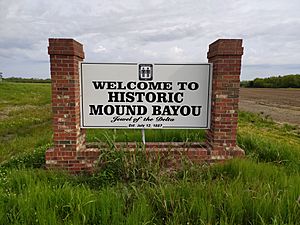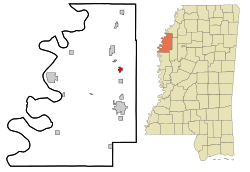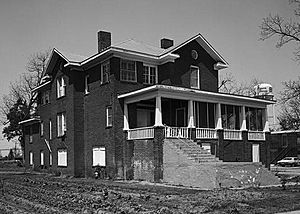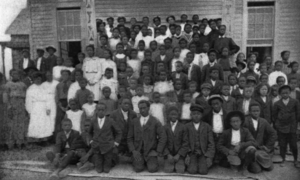Mound Bayou, Mississippi facts for kids
Quick facts for kids
Mound Bayou, Mississippi
|
|
|---|---|
 |
|
| Nickname(s):
Jewel of the Delta
|
|

Location of Mound Bayou in Mississippi
|
|
| Country | United States |
| State | Mississippi |
| County | Bolivar |
| Founded | July 12, 1887 |
| Incorporated -City status |
February 23, 1898 May 12, 1972 |
| Area | |
| • Total | 0.88 sq mi (2.27 km2) |
| • Land | 0.88 sq mi (2.27 km2) |
| • Water | 0.00 sq mi (0.00 km2) |
| Elevation | 144 ft (44 m) |
| Population
(2020)
|
|
| • Total | 1,534 |
| • Density | 1,749.14/sq mi (675.62/km2) |
| Time zone | UTC-6 (CST) |
| • Summer (DST) | UTC-5 (CDT) |
| ZIP code |
38762
|
| Area code(s) | 662 |
| FIPS code | 28-49320 |
| GNIS feature ID | 2404316 |
Mound Bayou is a city located in Bolivar County, Mississippi, United States. It is a special place because it was founded in 1887 by former slaves. They wanted to create their own independent community.
The city's population was 1,534 people in 2020. Mound Bayou is known for having one of the largest populations of African Americans in the United States. Its historic district is recognized and listed on the National Register of Historic Places.
Contents
History of Mound Bayou

Mound Bayou's story began with African Americans who had been freed from slavery. Many came from a community called Davis Bend, Mississippi. This community was started in the 1820s by Joseph E. Davis. He was the older brother of Jefferson Davis, who later became the president of the Confederacy.
Joseph Davis wanted to create a different kind of slave community. He allowed some self-leadership and provided better care for the enslaved people. After the Civil War, Davis Bend became a free community. Joseph Davis sold his land to Benjamin Montgomery, a former slave who had been a leader there. However, problems like low cotton prices and floods made it hard for Davis Bend to succeed.
In 1887, Isaiah T. Montgomery led the founding of Mound Bayou. He was one of the freed people from Davis Bend. They chose a new area in the Delta region. This area was undeveloped, offering a chance for freedmen to buy land. In 1892, the Mound Bayou Normal Institute, a school for black students, was opened.
Mound Bayou became a symbol of hope for African Americans across the country. In 1908, President Theodore Roosevelt visited the town. He called it "an object lesson full of hope for the colored people." Booker T. Washington also praised Mound Bayou. He said it was a place where Black people could see what their race had achieved.
By 1900, many Black farmers owned land in the Delta. But they faced challenges like losing political power and falling cotton prices. This led to economic struggles for Mound Bayou in the 1920s and 1930s. Many farmers became sharecroppers, meaning they worked on land owned by others.
Mound Bayou began to recover in 1942. This was after the Taborian Hospital opened. This hospital was run by a group called the International Order of Twelve Knights and Daughters of Tabor. It offered affordable healthcare to thousands of Black people in the Mississippi Delta. Dr. T.R.M. Howard was the chief surgeon. He became a very successful Black businessman in the state.
In 1952, Medgar Evers, a civil rights leader, moved to Mound Bayou. He worked for Dr. Howard's insurance company. Dr. Howard introduced Evers to civil rights work through the Regional Council of Negro Leadership (RCNL). This group fought for equal rights. They organized boycotts against places that treated Black people unfairly. The RCNL held large rallies in Mound Bayou, drawing thousands of people.
Mound Bayou was a safe place during a difficult time. Author Michael Premo described it as an "oasis in turbulent times." He noted that Mound Bayou had no racial segregation laws. Black residents could vote and owned many businesses. It was a great example of self-determination and economic strength for the Black community.
Geography of Mound Bayou
Mound Bayou is located in Mississippi. U.S. Routes 61 and 278 pass near the city. These routes lead south to Cleveland, which is the largest city in Bolivar County. They also go north to Clarksdale.
The city of Mound Bayou covers a total area of about 0.9 square miles (2.27 square kilometers). All of this area is land.
Population and People
| Historical population | |||
|---|---|---|---|
| Census | Pop. | %± | |
| 1900 | 287 | — | |
| 1910 | 537 | 87.1% | |
| 1920 | 803 | 49.5% | |
| 1930 | 834 | 3.9% | |
| 1940 | 806 | −3.4% | |
| 1950 | 1,328 | 64.8% | |
| 1960 | 1,354 | 2.0% | |
| 1970 | 2,134 | 57.6% | |
| 1980 | 2,917 | 36.7% | |
| 1990 | 2,222 | −23.8% | |
| 2000 | 2,102 | −5.4% | |
| 2010 | 1,533 | −27.1% | |
| 2020 | 1,534 | 0.1% | |
| U.S. Decennial Census | |||
Population in 2020
The 2020 United States Census counted 1,534 people living in Mound Bayou. There were 641 households and 376 families.
The table below shows the different racial and ethnic groups in Mound Bayou:
| Race / Ethnicity (NH = Non-Hispanic) | Pop 2000 | Pop 2010 | Pop 2020 | % 2000 | % 2010 | % 2020 |
|---|---|---|---|---|---|---|
| White alone (NH) | 17 | 14 | 7 | 0.81% | 0.91% | 0.46% |
| Black or African American alone (NH) | 2,061 | 1,503 | 1,485 | 98.05% | 98.04% | 96.81% |
| Native American or Alaska Native alone (NH) | 1 | 0 | 0 | 0.05% | 0.00% | 0.00% |
| Asian alone (NH) | 5 | 1 | 0 | 0.24% | 0.07% | 0.00% |
| Pacific Islander alone (NH) | 0 | 0 | 0 | 0.00% | 0.00% | 0.00% |
| Some Other Race alone (NH) | 1 | 0 | 5 | 0.05% | 0.00% | 0.33% |
| Mixed Race/Multi-Racial (NH) | 9 | 1 | 26 | 0.43% | 0.07% | 1.69% |
| Hispanic or Latino (any race) | 8 | 14 | 11 | 0.38% | 0.91% | 0.72% |
| Total | 2,102 | 1,533 | 1,534 | 100.00% | 100.00% | 100.00% |
Population in 2010
In 2010, there were 1,533 people living in Mound Bayou. Most of the population, 98.0%, was Black. About 0.9% were White, 0.1% were Asian, and 0.1% were from two or more races. About 0.9% of the population was Hispanic or Latino.
Education in Mound Bayou
Schools for Kids
The schools in Mound Bayou are part of the North Bolivar Consolidated School District. This district runs I.T. Montgomery Elementary School in Mound Bayou. It also operates Northside High School in Shelby. The elementary school is named after Isaiah T. Montgomery, one of the city's founders.
In the past, Mound Bayou faced challenges with its schools. A report from 1915 said that the school had over 300 students but not enough equipment. Teachers were also not paid very well, and the school year was short.
St. Gabriel Mission School was a Catholic school in Mound Bayou. It opened in 1954 for grades K-8. A high school section opened in 1958 but closed in 1961. The school stopped teaching regular grades in 1994 and became a preschool. The preschool closed in 2001.
In 2014, the North Bolivar School District joined with the Mound Bayou Public School District. They formed the North Bolivar Consolidated School District. John F. Kennedy Memorial High School in Mound Bayou closed in 2018.
Colleges and Universities
Students from Bolivar County can attend two community colleges. These are Coahoma Community College and Mississippi Delta Community College. Their main campuses are in nearby areas.
Notable People
Born in Mound Bayou
- General Crook, a musician
- Lorenzo Gray, a baseball player
- Katie Hall, a U.S. Representative
- Kevin Henry, a football player
- Russell Holmes, a Massachusetts state representative
- Melvin "Mel" Reynolds, a politician
- Kelly Miller Smith, Sr., a preacher and civil rights leader
Lived or Worked in Mound Bayou
- Isaiah Montgomery, the founder of the town
- Medgar Evers, a civil rights leader
- Myrlie Evers-Williams, a civil rights leader and journalist
- Fannie Lou Hamer, a civil rights leader
- T. R. M. Howard, a civil rights leader, businessman, and surgeon
- Harold Robert Perry, the first African-American Catholic bishop in the 20th century
- Lewis Ossie Swingler, a journalist and newspaper publisher
- Ed Townsend, a singer, songwriter, and producer
- Minnie L. Fisher, a local community activist
See also
 In Spanish: Mound Bayou para niños
In Spanish: Mound Bayou para niños
 | Anna J. Cooper |
 | Mary McLeod Bethune |
 | Lillie Mae Bradford |



